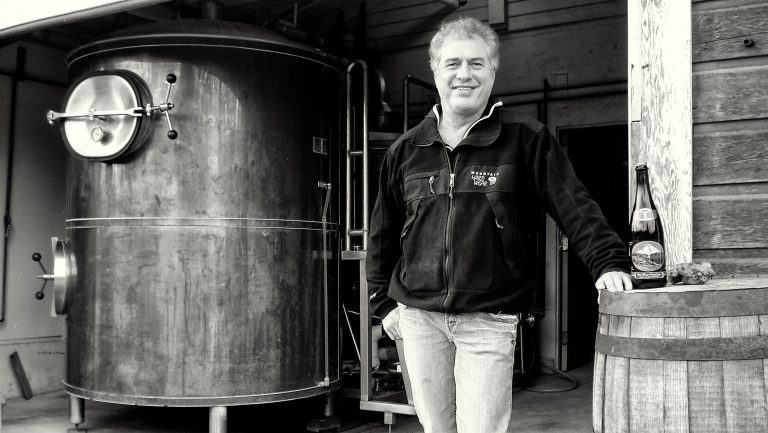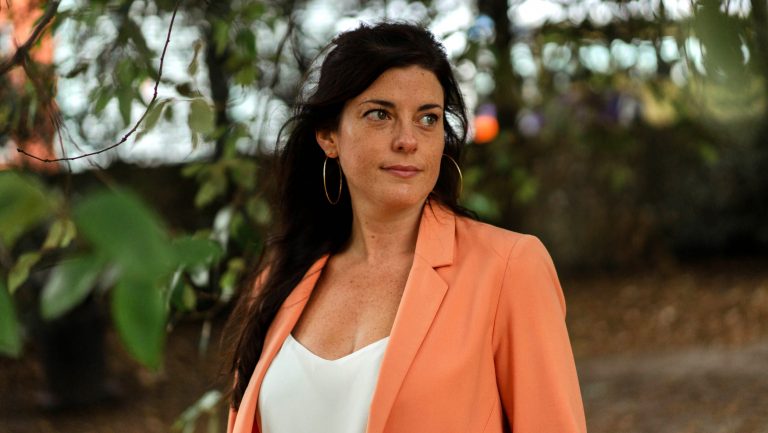After four decades of helping to jump-start and fine-tune the craft beer industry, David Logsdon, the brewer, pioneer in yeast propagation, and owner of Logsdon Farmhouse Ales in Hood River, Oregon, is ready to pass the baton to the next generation of Pacific Northwest craft brewers.
Calling it a retirement is a stretch, given the many chores associated with life on a working farm, but many of the tanks and barrel stacks that used to populate Logsdon’s farm-brewery have departed for Logsdon Farmhouse Ales’ new brewery space in Washougal, on the Washington side of the Columbia River Gorge.
Logsdon charted an impressive course throughout his career, from starting Wyeast Laboratories in 1985 and providing yeast to iconic Oregon brewers like Widmer Brothers, Portland Brewing, Rogue, and Deschutes to launching beer brands like Full Sail Brewing Company in 1987 and his own Farmhouse Ales label in 2009, where he perfected now-fashionable styles like brettanomyces-laced ales, seasonal fruit beers, and wild fermented saisons, before they became trendy.

Don’t miss the latest drinks industry news and insights. Sign up for our award-winning newsletters and get insider intel, resources, and trends delivered to your inbox every week.
“I don’t know how we found Dave,” says Rob Widmer, the cofounder of Widmer Brothers Brewing in Portland. “But he held our hands during the early years. Many people helped in those days, but Dave helped us sleep a bit better at night when it came to yeast.” Widmer Brothers’ flagship product, Hefe, an American-style Hefeweizen (wheat beer with yeast), wouldn’t have been the same without Logsdon’s yeast expertise. “[Our] Hefeweizen is all about the yeast,” Widmer says. “It makes Hefe hefe [yeasty].”
Comparing the Oregon craft beer community of the late 1970s, when Logsdon arrived, with the current one is almost like comparing horses with automobiles. “‘Craft beer’ hadn’t been coined yet,” Widmer explains. “Very few people had heard of microbrews; there were very few homebrewers—hard to imagine the time, really.” Significant progress has been made since then, and Logsdon has been at or near the forefront throughout, prolific in helping turn what was essentially a hobby—or, at least a novelty—into the production of world-class beer.
The Early Days
Logsdon was raised on a farm in the late 1950s in the small town of New Riegel, Ohio. He had a big extended family, with a particular affinity for good beer. Logsdon recalls that family functions, whether graduations, weddings, or birthdays, typically featured a selection of interesting beers from labels like Hudepohl in Cincinnati, which stood out from the tepid beers that dominated the American market in those days.
With no designs on college and already the casualty of a factory layoff, Logsdon headed west in the mid-1970s, first to California, and then north to Oregon. “I heard there were good college deals for the unemployed there,” he says of his sojourn to the Beaver State. “I went to school for food science at Mount Hood Community College and [while there] ended up managing the bacteria stock for the school as a lab technician.”
On the side, Logsdon started homebrewing. After he graduated, he landed a day job with Boyd’s Coffee Company in the quality-control department, where he gained a vital understanding of production scale and scientific method. At home, Logsdon’s beers were getting sharper and more complex. “I was feeling good about what I was making,” Logsdon says. “At that point, I thought this microbiology thing just might work.”
In between culturing his own yeast strains, Logsdon attended impromptu beer summits at brewpubs like McMenamins in Portland, where he exchanged ideas with many of the founding fathers of Oregon beer. Among these were Kurt Widmer (cofounder of Widmer Brothers), Tom Baune (Pyramid Brewing), Art Larrance (Cascade Brewing), Fred Bowman (Portland Brewing), and the late Fred Eckhardt, who wrote two seminal books on craft beer (A Treatise on Lager Beers, in 1969, and The Essentials of Beer Style, two decades later) and whom Logsdon describes as having been the dean of those gatherings.
“We were just eager brewers, getting together to talk about what we knew and what we were looking for,” Logsdon says. At the time, F.H. Steinbart was the only homebrew shop in town, and certain speciality ingredients were purchased at local sporting goods chains like G.I. Joe’s. “There was dried yeast, brown hops, and malt extract,” Logsdon recalls, wincing.
Launching a Pioneering Yeast Lab
In 1985, the same year Oregon adopted crucial legislation that allowed breweries to sell their production on premise, Logsdon started Wyeast Laboratories. The lab was focused on yeast at a time when yeast wasn’t yet on the radar of most brewers. Logsdon developed the company’s breakthrough product in his basement over the span of a few years.
The liquid yeast Smack-Pack Activator package, as the product was dubbed, was designed to directly inoculate standard-gravity ale wort. It accomplished two major feats: First, it yielded clean and efficient fermentations; second, it proved its own viability, expanding with carbon dioxide as the yeast began to feed. In other words, brewers using the Smack-Pack no longer had to waste time experimenting with unfamiliar cultures or with yeast products that took weeks or months to ship from Europe. The Smack-Pack Activator altered the Pacific Northwest brewing landscape.
“Dave brought liquid yeast to the brewing world, and he did it with a great zeal for a diversity of species and strains,” says Charles Porter, the founder of Little Beast Brewing in Beaverton, who also brewed at Deschutes, Full Sail, and Logsdon Farmhouse Ales. “I feel that those two things have been overlooked at times and not recognized by the greater [brewing] community.”
Porter has long appreciated Logsdon’s focus on microbiology. “When I started brewing farmhouse beers 15 years ago,” he says, “[Logsdon] really changed how I approached brewing—using science to create drinkable art. David’s contribution to the science of brewing by way of liquid yeast and diverse cultures helped make that possible here in the U.S.”
Logsdon was on the ground floor, providing specialty cultures that not only sparked fermentations but helped empower entire brands. By 1986, Portland, Widmer, and BridgePort were all brewing—and within a stone’s throw of each other. “Having Wyeast so close to us was such a boon,” says Rob Gansberg, a founding brewer at Portland who is currently in his third decade with Cascade Brewing. “Up to 50 percent of a beer’s flavor can be contributed by the yeast.” Not only did Logsdon offer guidance on how to use different yeasts in beer, but he offered local brewers easy access to yeast products. Wyeast, Gansberg says, played “an absolutely pivotal role … as the industry began to grow.”
Becoming a Professional Brewer
With a growing clientele, Logsdon immersed himself in the craft movement. He traveled on its behalf, collecting yeast samples in test tubes while at conferences. He began to supply wineries with malolactic cultures. When rumors circulated around Hood River about a new brewery, Logsdon pounced on the opportunity. “I remember thinking,” he says, “They’re not gonna do this without getting me involved.”
In 1987, Logsdon started Full Sail with Irene Firmat and Jerome Chicvara and served as its founding brewmaster. Full Sail turned out 287 barrels of Golden Ale in its inaugural year. Logsdon was intent on injecting some complexity into what he considered a bland Oregon beer scene at the time—Full Sail produced flavorful pale ales, pilsners, and the state’s first amber. He continued Wyeast on the side and took on about a dozen employees by the early 1990s.
By 2003, Logsdon had shifted his primary focus back to the lab, but he would run into Porter, who was then brewing for Full Sail, at the brewery’s tasting room. The two shared a love of farmhouse beers, and before long they were chatting about a potential label at Logsdon’s Hood River farm. In 2009, the farm-brewery’s LLC was formed.
“When we founded Logsdon Farmhouse Ales,” says Porter, “we joined a small list of American breweries crafting farmhouse-style ale—Allagash, Trinity Brewing, Russian River, Hill Farmstead, The Bruery, and Upright Brewing, to name a handful.” The Logsdon label offered a focus on terroir mostly absent from craft beer at the time. Releases like the Seizoen Bretta, a vibrant, bottle-conditioned ale made with five yeast strains, captured Logsdon’s love for Belgian style and terroir. The beer won gold at the Great American Beer Festival in 2012.
“I think it’s fair to say that we were all ahead of the game in the New World,” says Porter. “Dave has a keen ability to be resourceful. Utilizing the materials on hand at Logsdon Farmhouse Ales was essential at times when we were bottling and the filler would break down—we always had some random parts in the back of the barn! I’ve always been resourceful, but working with Dave certainly ingrained a greater sense of economy.”
Under Logsdon’s Influence
Citing Logsdon’s use of ingredients like whole oats, multiple yeast strains, and locally sourced fruit, John Plutshack, the general manager of Logsdon Farmhouse Ales, points out that the way Logsdon builds a beer is particularly distinctive. “The core of the brewery has always been what Dave’s wanted to do,” he says. “He’s always been into Belgian beer, been a yeast person, and appreciated [ageability in beer]—and his beers reflect all of that.”
Andrew Harmon, a bartender at The Beermongers, a popular bottle shop and taphouse in Portland, says that Dave Logsdon was the first brewer who helped him recognize the importance—and the role—of yeast in beer. “His use of seasonal Northwest fruit has always been outstanding as well, but it’s always been about the yeast,” he says. “When I learned that Seizoen has five strains of yeast in it, it just blew my mind. It makes perfect sense that someone who started a company like Wyeast would go on to found a brewery where yeast is always the star—and everything else comes second.”
Christian DeBenedetti visited Logsdon while doing research for his first book, The Great American Ale Trail. “The operation seemed both bootstrapped and sprinkled with some kind of Flemish farmhouse fairy dust,” he recalls, as he describes how Logsdon had set up a coolship (a wort-cooling vessel) for spontaneous fermentations, raised Scottish Highlander cattle to consume spent wort, and planted Schaerbeek cherries for lambics. “In the U.S. almost no one was doing anything like it in 2011, but there were a few of us dreaming.”
Like so many other brewers, DeBenedetti was moved by the sense of place in both Logsdon’s farm-brewery and his beers. It helped inspire him to start a like-minded operation in Newberg—Wolves & People—several years later. “Dave and his team brought so much experience, optimism, and hard work to that little farm,” he says, “you couldn’t help but be fired up.”
The Next Generation
Logsdon is retiring feeling contented. Wyeast remains in good hands, with an extensive collection of yeast strains and fermentation products; 25 employees, including all three of Logsdon’s daughters; and Logsdon Farmhouse Ales possesses a product portfolio that includes not only beer but cider, sake, and spirits too.
The Logsdon Farmhouse Ales label, despite interest from big beer companies over the years, retains original ownership and is upgrading from the impracticalities of a barn setting to a proper brewery space in Washougal. Brewer Shilpi Halemane is now at the helm, and Logsdon says that he’s maintaining Farmhouse’s high quality standards. A few wild-fermented beers will still be assembled at Logsdon’s farm, but for the most part, Logsdon will “get his house back.”
As customized yeast strains, barrel-aged programs, and fruit-forward sours continue to swell in a craft beer market with some 6,000 players currently, Logsdon can savor his significance—the fact that people create and treat beer today with the nuance normally associated with wine is owed at least in part to his career.

Dispatch
Sign up for our award-winning newsletter
Don’t miss the latest drinks industry news and insights—delivered to your inbox every week.
Mark Stock is a writer from Portland, Oregon, who is now based there. He spent a decade making, selling, and cleaning up wine in the Willamette Valley in between penning stories for a host of regional and national outlets. He adores Iceland, brown trout, aquavit, and grunge rock.







